If you're considering a central air conditioner Windsor installation, you're looking at one of the smartest investments for your home's comfort and value. Here's what you need to know:
Quick Facts About Central Air Conditioners in Windsor:
Windsor's humid summers and unpredictable weather patterns make central air conditioning more than just a luxury - it's a necessity for maintaining comfortable indoor temperatures and healthy air quality. With Nova Scotia's energy costs, choosing an efficient system can lead to significant long-term savings.
Central air systems work by circulating cool air through your home's existing ductwork, providing consistent temperatures in every room. Unlike window units or portable ACs, these systems operate quietly and don't take up valuable living space.
The benefits are clear: whole-home comfort, improved air quality, increased property value, and lower energy bills when you choose a high-efficiency model. Many Windsor homeowners are also finding that modern heat pump systems can provide both heating and cooling, making them an even smarter investment.
According to local HVAC contractors, "Most air conditioning units have a SEER rating between 13 and 21. If energy conservation is a priority, look for a system with a high SEER." This advice becomes especially important given Nova Scotia's rising electricity costs.
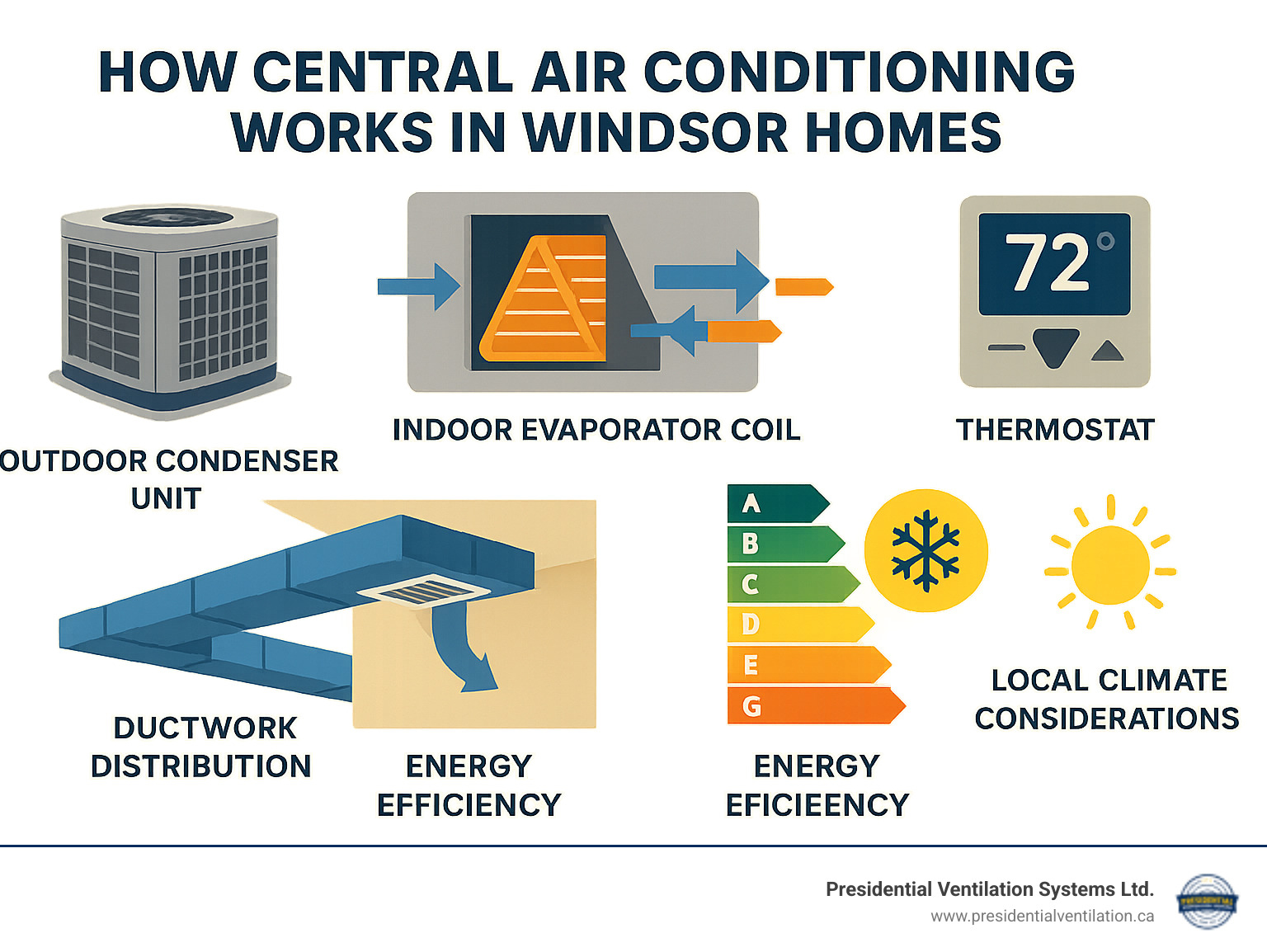

Picture this: you're walking along Windsor's beautiful waterfront on a gorgeous summer day, enjoying the sunshine and harbor views. But by the time you get home, that same sunshine has turned your house into an oven, and the humidity makes everything feel sticky and uncomfortable.
That's where a central air conditioner Windsor system becomes your best friend. Unlike those noisy window units that cool just one room, central air delivers consistent cooling throughout your entire home. Walk from your living room to your bedroom to your kitchen - the temperature stays perfectly comfortable everywhere.
But here's what really makes central air shine in our Nova Scotia climate: humidity control. Those muggy summer days that make your clothes stick to your skin? Central air tackles that head-on by pulling moisture right out of the air as it cools your home.
The benefits go way beyond just feeling comfortable though. You'll notice improved indoor air quality as your system filters out dust, pollen, and other airborne particles. Your home's value gets a nice boost too - buyers love seeing central air already installed. And unlike those rattling window units, central air operates with quiet operation that won't wake you up at night.
Modern systems, especially heat pumps, work double duty by cooling your home in summer and heating it efficiently in winter. For more details about how these versatile systems can work in your Windsor home, check out our guide on Ducted AC Systems Windsor.
Let's talk about something every Nova Scotia homeowner knows too well - humidity. Our summers can feel like you're living inside a wet blanket, and that moisture doesn't just make you uncomfortable. It creeps into every corner of your home, creating the perfect conditions for mold to grow in dark spaces like basements and closets.
That expensive wooden dining table your grandmother left you? High humidity can make it warp and crack. Your hardwood floors might start creaking and buckling. Even your books and photo albums can get damaged by too much moisture in the air.
A central air system acts like a giant dehumidifier for your entire home. As it cools the air, it naturally pulls out excess moisture, keeping humidity levels in that sweet spot where you feel comfortable and your home stays protected. Mold prevention becomes automatic, and your wood furniture stays in great shape for years to come.
The result? Improved comfort that goes beyond just temperature. You'll sleep better, breathe easier, and stop feeling like you need a shower every time you walk upstairs on a humid day.
Here's something that might surprise you - the air inside your home is often more polluted than the air outside. All those tiny particles floating around - dust from daily life, pollen that sneaks in through windows, pet dander from your furry friends - they all get trapped inside and keep circulating.
If anyone in your family deals with allergies or asthma, you know how miserable this can make them feel. Sneezing fits, watery eyes, and that stuffy feeling that never quite goes away.
A central air system with good filtration works around the clock to clean your air. It captures allergen reduction happens naturally as the system pulls in air, filters out the bad stuff, and sends clean air back through your home. Dust filtration means less dusting for you (bonus!), and pet dander gets caught before it can make sensitive family members uncomfortable.
The end result is what every family wants - a healthier living space where everyone can breathe easy and feel their best. It's like having a personal air cleaner working 24/7 to keep your home's air fresh and clean.
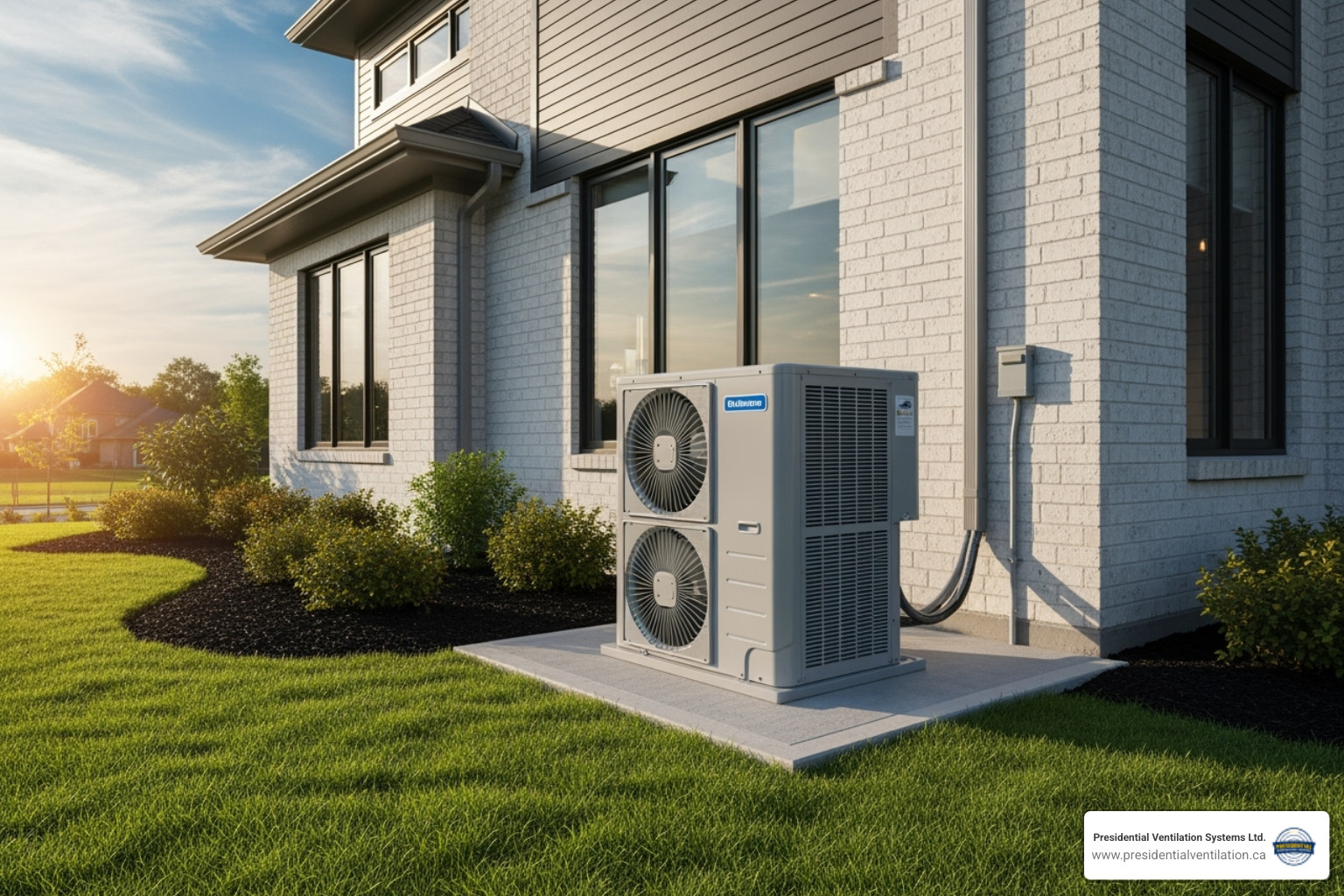
Selecting the perfect central air conditioner Windsor system for your home doesn't need to feel overwhelming. Think of it as finding the right pair of shoes – you need something that fits just right and will serve you well for years to come. The key is understanding what makes one system different from another and how those differences impact your comfort and wallet.
When you're shopping around, you'll encounter several trusted brands that perform well in Nova Scotia's climate. Daikin, Lennox, Goodman, Amana, Carrier, and Trane all offer reliable systems with different features and efficiency levels. Each has its strengths, but what matters most is finding the right match for your specific home and needs.
The beauty of modern central air systems lies in their variety. Whether you have a cozy bungalow or a sprawling two-story home, there's a system designed to keep you comfortable. The trick is knowing which system type and BTU capacity will work best, along with understanding how energy efficiency ratings can save you money month after month.
Your home is unique, and your cooling system should be too. That's why we always start with understanding your specific situation before recommending any equipment.
Home size is the obvious starting point, but it's not just about square footage. We need to consider how many rooms you want to cool and how your home is laid out. A 1,500 square foot bungalow has very different cooling needs than a 1,500 square foot two-story home.
Insulation levels play a huge role in how hard your system needs to work. Well-insulated homes hold onto that precious cool air, while poorly insulated ones let it escape faster than you can say "electric bill." Similarly, window quality makes a real difference – those old single-pane windows might have character, but they're not doing your air conditioner any favors.
Here's something many homeowners don't think about: ductwork condition. Your ducts are like the highway system for your cool air. If they're leaky or poorly designed, even the best air conditioner will struggle to keep you comfortable. We always take a good look at your existing ductwork to make sure it's ready to deliver.
The most important step is what we call a professional load calculation. This isn't just measuring rooms and making educated guesses. It's a detailed analysis that considers everything from your home's orientation to local climate patterns. Getting this right means your system won't be too small (leaving you sweating) or too large (wasting energy and failing to control humidity properly).
If you've started looking at air conditioners, you've probably seen those SEER ratings and wondered what they actually mean. SEER stands for Seasonal Energy Efficiency Ratio, and it's basically a report card for how efficiently your system converts electricity into cool, comfortable air.
Think of SEER ratings like fuel economy for cars. A higher number means you get more cooling for every dollar you spend on electricity. Most systems today range between 13 and 21 SEER, with higher numbers delivering better efficiency and lower monthly bills.
Here's where it gets interesting for Windsor homeowners. With Nova Scotia's electricity costs, choosing a high-efficiency system can mean significant savings over the years. An ENERGY STAR rated system can cut your heating and cooling costs by up to 45% compared to older, less efficient units.
The minimum standards have improved over the years, which is great news for homeowners. Even basic systems today are more efficient than premium units from a decade ago. But if you're planning to stay in your home for many years, investing in higher efficiency often pays for itself through long-term cost savings.
For more information about energy-efficient models and potential rebates that could help offset your investment, check out Efficiency Nova Scotia.
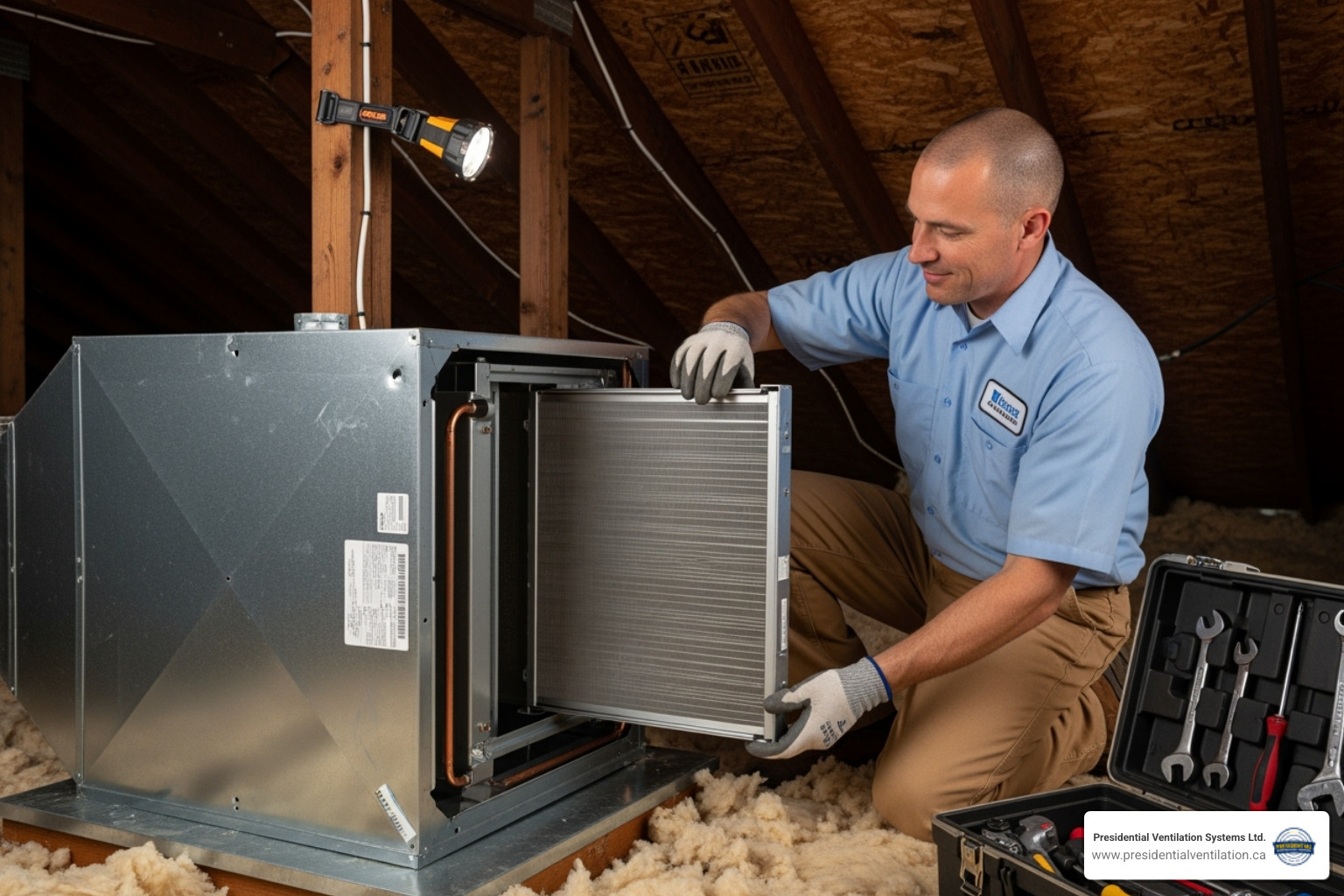
Getting your new central air conditioner Windsor system installed doesn't have to feel overwhelming. When you work with the right team, it's actually a pretty straightforward journey from that first phone call to enjoying perfectly cool air throughout your home. We've guided countless Windsor families through this process, and we're here to walk you through exactly what to expect.
The key to a successful installation starts long before we arrive at your door. It begins with finding reliable contractors who understand both the technical side and the importance of treating your home with respect. Once that's sorted, the actual installation day tends to go smoothly - though there are definitely some things worth knowing ahead of time.
Choosing the right contractor for your central air installation is honestly one of the most important decisions you'll make in this whole process. We've seen too many homeowners end up frustrated because they went with the cheapest quote without doing their homework first.
Licensed technicians should be your starting point - never compromise on this. Any reputable company will happily show you their credentials and insurance verification. At Presidential Ventilation Systems Ltd., we've been serving Nova Scotia for over 30 years, and we're proud to be a leading Daikin Comfort Pro Dealer.
Customer reviews tell you everything you need to know about how a company treats people. Look for consistent patterns in feedback, not just the star rating. When you're getting written estimates, make sure everything is spelled out clearly - equipment costs, labor, any potential extras like ductwork modifications.
Here are the key questions you should ask any potential contractor:
Don't be shy about asking these questions. A good contractor welcomes them because they know they have solid answers.
Installation day is when all the planning comes together, and honestly, it's pretty exciting to see your new system take shape. Our team arrives ready to work efficiently while keeping your home clean and protected.
Protecting your home is our first priority. We lay down floor coverings and set up our workspace so you don't have to worry about dust or debris. If you're replacing an old system, we'll carefully disconnect and remove everything - outdoor unit placement for the old system gets reversed as we clear the way for your new equipment.
The indoor coil installation is where the magic happens inside your home. This component works hand-in-hand with your existing furnace or air handler, and our certified technicians know exactly how to integrate it with your current ductwork. It's usually installed above your furnace, and the whole process is surprisingly neat and organized.
Thermostat setup comes toward the end, and this is where you start to see your investment come to life. Whether you're getting a basic model or something smart like a Daikin One+, we make sure you understand how to use all its features before we leave.
System testing is our final step, and we don't cut corners here. We run through every function, check airflow in each room, and make sure everything operates quietly and efficiently. We won't pack up our tools until we're confident your new central air conditioner Windsor system is ready to keep you comfortable for years to come.
The whole process typically takes one to two days, depending on your home's setup. By the time we're done, you'll have consistent, quiet cooling throughout your entire home - and trust us, that first night of perfect sleep in a perfectly cool house makes the whole process worth it.
Let's talk money – because we know that investing in a central air conditioner Windsor system is a big decision for your family. The good news? There are more ways than ever to make this investment work for your budget, and we're here to help you steer all the options.
Think of us as your financial comfort advisors. We'll walk you through financing options that fit your situation, help you find government incentives you might not know about, and explain warranty coverage that protects your investment for years to come. And if you're considering a system that can handle both heating and cooling, don't forget to check out our Heat Pumps Windsor page for even more versatile options.
Every home is unique, and so is every installation. That's why we never give cookie-cutter pricing – we take the time to understand exactly what your home needs.
The unit price depends on which system makes the most sense for your family. Higher efficiency units with better SEER ratings might cost more upfront, but they'll reward you with lower energy bills month after month. It's like buying a fuel-efficient car – you pay a bit more initially but save at the pump for years.
Labour costs cover our certified technicians' expertise in getting everything installed perfectly. With over 30 years of experience, we've learned that doing it right the first time saves everyone headaches later.
Sometimes your ductwork needs some attention too. Maybe it needs minor repairs, or perhaps we need to add new ducts to reach that bonus room. We'll assess everything during our consultation so there are no surprises.
The size and complexity of your home also plays a role. A sprawling bungalow has different needs than a cozy two-story, and we factor that into our recommendations and pricing.
This is probably the most common question we hear, and honestly, both paths can work beautifully depending on your situation.
Renting appeals to many families because there's typically little to no money needed upfront. Your monthly payment covers everything – the equipment, installation, and usually maintenance too. It's predictable budgeting at its finest. Plus, when something needs fixing, that's covered under your rental agreement. No surprise repair bills on a Saturday morning when the AC decides to take a break.
Buying means you own the equipment outright (once it's paid off). You can take advantage of manufacturer promotions and government rebates – and in Nova Scotia, these can be substantial. We're talking up to $7,500 in rebates for eligible heat pump systems. Even traditional air conditioners might qualify for local utility rebates.
The ownership route also gives you complete control. Want to upgrade the thermostat? Go for it. Planning to stay in your home for many years? Ownership often makes the most financial sense in the long run.
Here's the thing – there's no universally "right" choice. We've helped families who were thrilled with rental agreements, and others who couldn't wait to own their system. During our consultation, we'll talk through your specific situation and help you figure out what makes the most sense for your family's comfort and budget.
Government rebates and financing options can make buying more attractive than you might think. Our team stays up-to-date on all available programs and can help you understand exactly what you qualify for. Sometimes the combination of rebates and financing makes ownership surprisingly affordable.
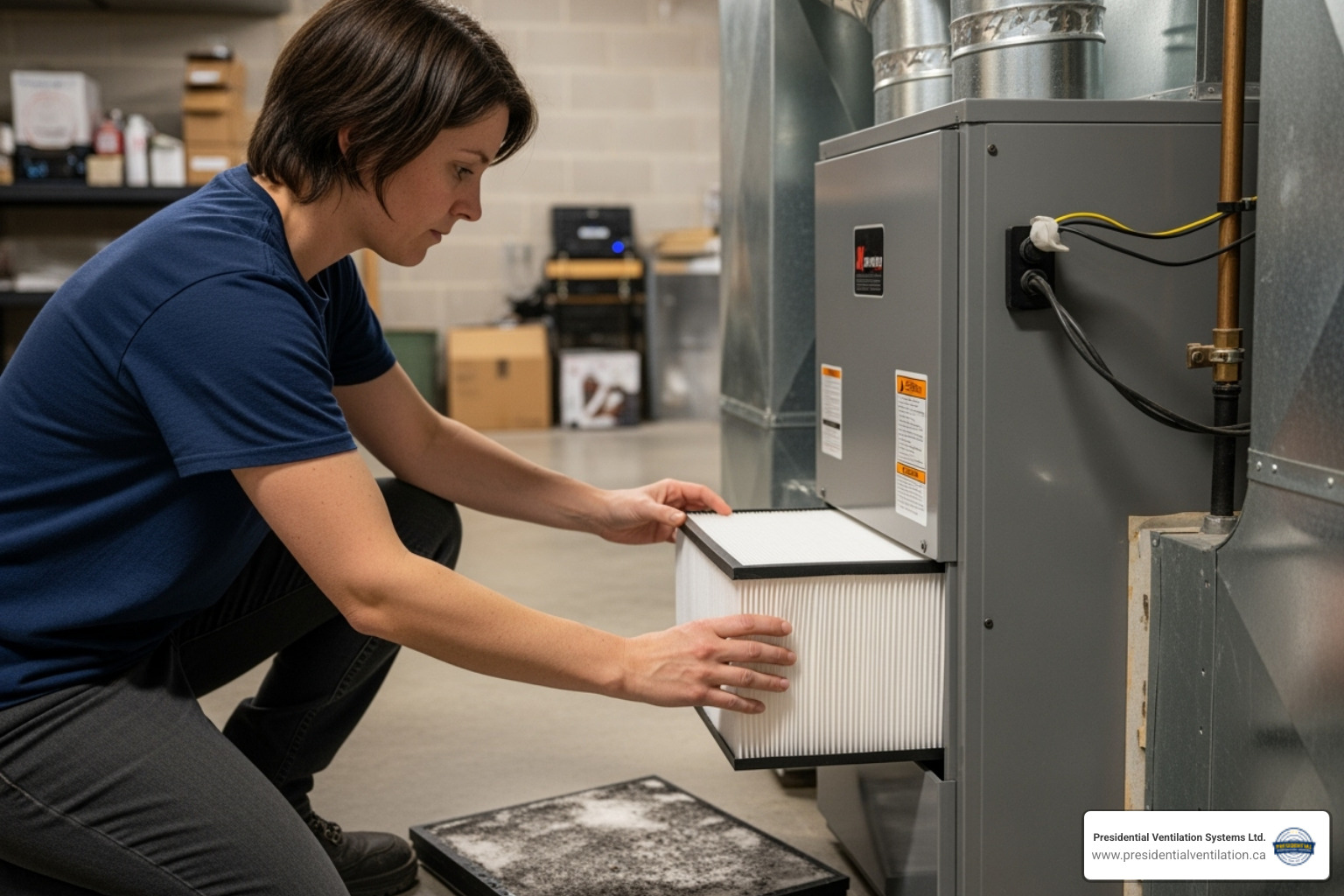
Your shiny new central air conditioner Windsor system is humming along beautifully, keeping your family comfortable through those sticky Nova Scotia summers. But like any hardworking appliance, it needs a little TLC to keep performing at its best. Think of it this way – you wouldn't skip oil changes for your car, right? Your AC deserves the same attention.
The good news is that with proper care, your central air system can keep you cool for 15-20 years or even longer. The key is knowing what to watch for and staying on top of routine maintenance. And when problems do arise, understanding whether it's time for a simple repair or a full replacement can save you both money and frustration. For detailed troubleshooting help, our Air Conditioner Repair Windsor guide covers the most common issues you might encounter.
Your AC system is pretty good at telling you when something's wrong – you just need to know how to listen. Strange noises are often the first red flag. If you're hearing grinding, squealing, or banging sounds that weren't there before, your system is crying out for help. These usually point to mechanical issues that need immediate attention.
Weak airflow is another telltale sign. When you put your hand up to a vent and barely feel a breeze, there could be blockages, fan problems, or issues with the blower motor. Similarly, if your system is constantly turning on and off instead of running in steady cycles, it might be oversized for your home or dealing with refrigerant issues.
Keep an eye on your electricity bills too. A sudden spike in energy costs during cooling season often means your AC is working overtime to achieve the same results. This inefficiency usually gets worse over time, not better.
Uneven cooling throughout your home is frustrating and often indicates your system is struggling. Some rooms feeling like saunas while others are comfortable suggests distribution problems or an improperly sized unit.
The age factor is crucial to consider. Most central air conditioners last between 10 to 15 years with proper maintenance. If your unit is pushing past the decade mark and showing multiple warning signs, you might be throwing good money after bad with repeated repairs. At that point, investing in a new, efficient system often makes more financial sense.
Here's where a little prevention goes a long way. Annual professional maintenance is like giving your AC system a complete physical exam. Our certified technicians perform thorough efficiency checks to ensure your system is operating at peak performance, which translates directly into lower energy bills for you.
Cleaning the coils is a big part of this process. Dirty evaporator and condenser coils are like trying to breathe through a dirty mask – everything works harder with less result. Professional cleaning improves heat transfer and system efficiency dramatically.
Checking refrigerant levels is another critical step. Low refrigerant doesn't just mean poor cooling; it can actually damage your compressor, leading to expensive repairs. Our technicians will also inspect for leaks and address them before they become bigger problems.
The real value of professional maintenance is in preventing breakdowns before they happen. There's nothing worse than your AC giving up on the hottest day of summer. Regular tune-ups help us catch small issues early, when they're still easy and affordable to fix.
Between professional visits, you can help by changing your furnace filter regularly. A clean filter is vital for optimal performance and better indoor air quality. It's one of the simplest things you can do to keep your system happy. Also, take a peek at your outdoor unit occasionally – clear away any leaves, grass clippings, or debris that might be blocking airflow.
Homeowner's insurance typically doesn't cover routine HVAC maintenance or repairs. That's why investing in a maintenance plan with us makes so much sense – it protects both your comfort and your wallet, ensuring your central air conditioner Windsor system keeps you cool for years to come.
Your journey to mastering home comfort in Windsor doesn't have to be complicated. A central air conditioner Windsor system truly transforms how you experience your home, offering that perfect balance of cool temperatures, controlled humidity, and clean air that makes every day more enjoyable.
We've walked through everything together - from understanding why central air is so essential in Nova Scotia's humid climate to choosing the right system for your specific needs. The benefits are clear: consistent cooling throughout your home, better air quality for your family's health, protection against humidity damage, and increased value for your property investment.
The installation process might seem daunting at first, but with the right professionals by your side, it becomes straightforward and stress-free. This isn't just about buying equipment - it's about creating a comfortable sanctuary where your family can thrive, no matter what Mother Nature throws at you outside.
Professional installation makes all the difference. When your system is properly sized, expertly installed, and regularly maintained, you'll enjoy reliable comfort and significant energy savings for years to come. Those monthly utility bills will thank you, especially when you've chosen a high-efficiency system that works smarter, not harder.
At Presidential Ventilation Systems Ltd., we've been helping Nova Scotia families stay comfortable for over 30 years. As your local Daikin Comfort Pro Dealer, we understand Windsor's unique climate challenges and know exactly what it takes to keep your home perfectly comfortable year-round. Our long warranties and commitment to exceptional service mean you can trust us to be there whenever you need us.
Ready to say goodbye to those sticky summer days and hello to cool, refreshing comfort? We're here to make it happen.
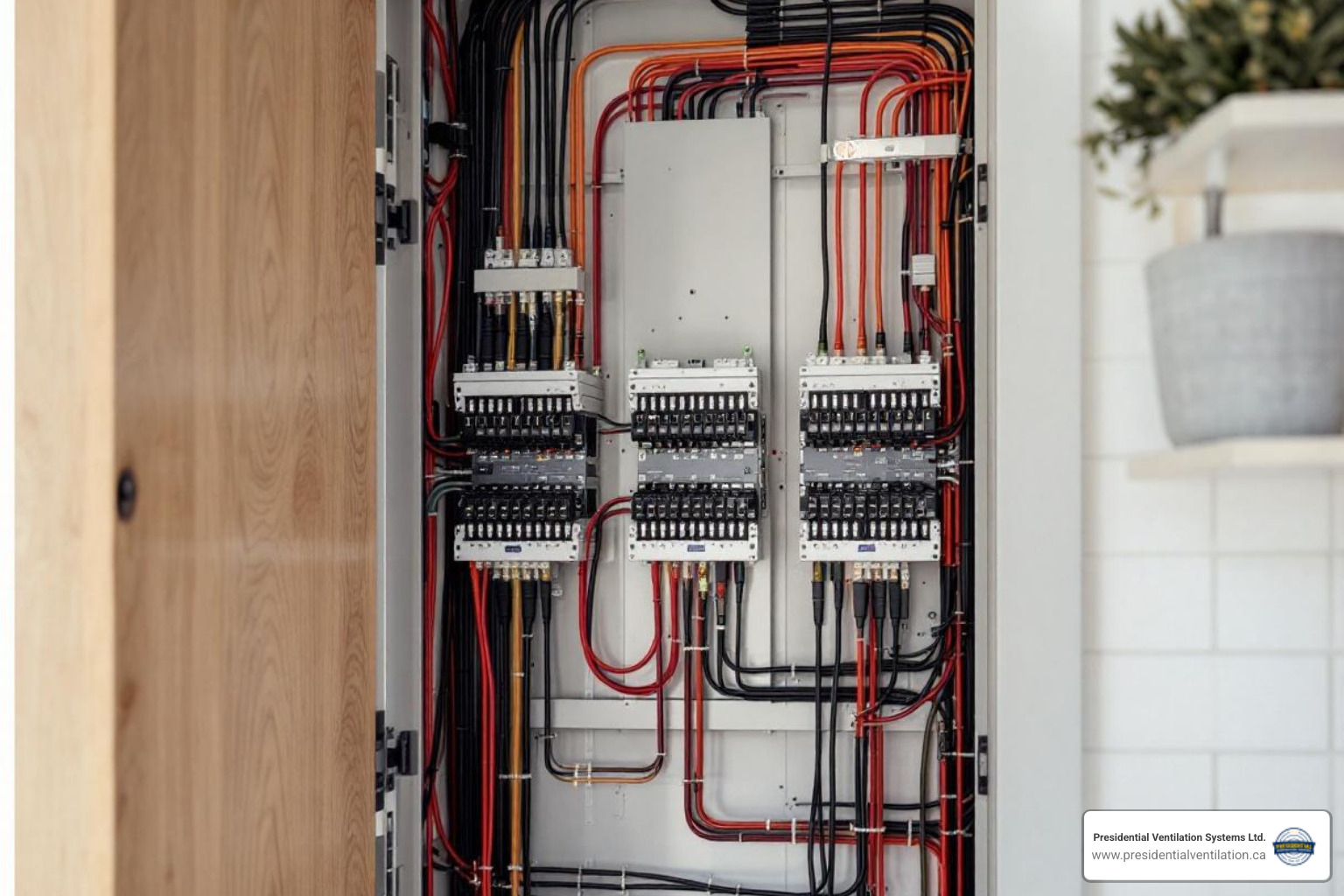


Finding the best electrical in mount uniacke, ns means connecting with licensed professionals who prioritize safety, code compliance, and quality workmanship in every project. Whether you're upgrading an outdated panel, wiring a new addition, or installing modern technology like EV chargers and heat pumps, the right electrician makes all the difference for your home's safety and functionality.
Many homes in Mount Uniacke built before 1990 face challenges with outdated electrical infrastructure. Aluminum wiring, undersized panels, and circuits that can't handle modern appliances create safety risks and limit your home's functionality. Professional electricians bring the expertise to upgrade these systems safely, ensuring your home meets current Canadian Electrical Code standards while supporting your family's power needs.
For comprehensive electrical solutions that prioritize your safety and comfort, explore our electrical services in Mount Uniacke, NS or contact us today for a free consultation.
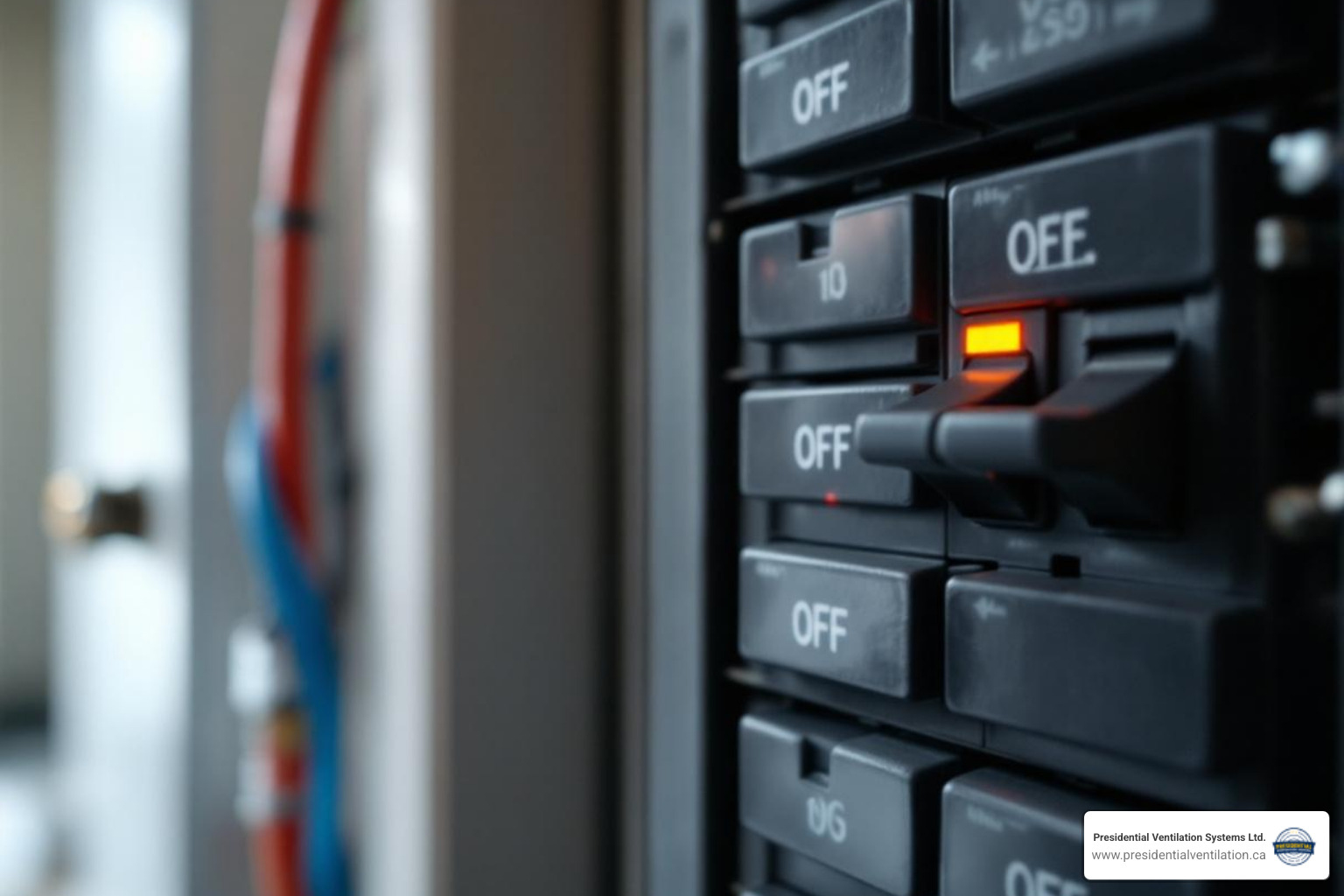
Choosing an electrician for your home or business in Mount Uniacke is a decision that impacts your safety, comfort, and peace of mind. We understand that you want reliable, expert service, and we believe these five factors are essential to consider.
When searching for the best electrical in mount uniacke, ns, the first thing to check is proper licensing and certification. We ensure our electricians are Red Seal-certified, which means they've met a national standard of excellence through rigorous training and examinations. This certification isn't just a badge; it signifies a deep understanding of the Canadian Electrical Code and provincial regulations, ensuring all work is safe and compliant. Choosing a certified professional means your electrical systems are installed, maintained, and repaired according to the highest safety standards, protecting your property and loved ones. For more on electrical safety, visit our page on Electrical Safety Services Canada.
Electrical work, while essential, carries inherent risks. That's why verifying your electrician has comprehensive liability insurance and Workers' Compensation Board (WCB) coverage is non-negotiable. Our insurance policies protect you from financial responsibility should any unforeseen accidents or damages occur during a project. WCB coverage ensures that if an electrician is injured on your property, their medical expenses and lost wages are covered, preventing you from being held liable. This dual protection offers you financial security and peace of mind, knowing that you're working with a responsible and prepared service provider.
Experience truly matters in the electrical field. We pride ourselves on having over 30 years of experience serving communities like Mount Uniacke, tackling everything from routine repairs to complex installations. A long-standing presence in the community often translates to a deep understanding of local electrical needs and building nuances. Beyond years in service, look at a company's reputation. Customer reviews and Better Business Bureau (BBB) ratings, such as an A+ rating, are excellent indicators of a company's commitment to quality and customer satisfaction. The BBB, for example, strives for an ethical marketplace where buyers and sellers trust each other. A strong reputation built on positive feedback and a solid project portfolio speaks volumes about the quality of work you can expect.
The needs of Mount Uniacke homes and businesses are diverse, ranging from simple light fixture installations to complex system overhauls. The best electrical in mount uniacke, ns will offer a comprehensive suite of services. This includes residential expertise for new home wiring, renovations, and panel upgrades, as well as commercial capabilities for businesses. We specialize in a wide range of services, including dedicated hookups for high-demand appliances, EV charger installations, and troubleshooting common electrical issues. Whether you need an electrician for your home or your commercial property, ensure they have the specific skills and experience required for your project. You can learn more about our Best Commercial Electrical Mount Uniacke NS offerings.
Finally, effective communication and professionalism are hallmarks of an excellent electrical service provider. From your initial inquiry to the completion of the project, you should expect transparent estimates, clear project timelines, and honest communication. Our team believes in keeping you informed every step of the way, answering all your questions, and respecting your home or business. We ensure our workspace is clean and safe, and our electricians are courteous and professional. This commitment to clear communication and high standards of professionalism ensures a seamless and stress-free experience, building trust for future electrical needs.
Mount Uniacke homes, like many in Nova Scotia, often require a variety of electrical services to ensure safety, efficiency, and comfort. From tackling home renovations to ensuring new constructions are up to code, and performing essential safety inspections, our team is equipped to handle it all. We also excel at troubleshooting those perplexing electrical issues that can disrupt your daily life. For commercial properties, we also offer comprehensive Commercial Electrical Repairs.
Our homes today demand more power than ever before. With an increasing number of appliances, smart devices, and entertainment systems, older electrical panels often struggle to keep up. If your home still uses fuses, your panel is over 25 years old, or you experience frequent breaker trips, it's a clear sign you need a panel upgrade.
A panel upgrade or electrical service upgrade increases your home's electrical capacity, allowing it to safely support modern appliances and technology. For example, a growing family might need to replace an outdated 100-amp panel with a modern 200-amp service to accommodate new kitchen appliances, a home office, or an EV charger. This upgrade not only prevents inconvenient power outages but also improves the overall safety and value of your property.
Many homes in Mount Uniacke built before 1990 may have outdated electrical infrastructure, such as aluminum wiring or cloth-insulated wires. These older wiring systems can pose significant safety risks, including fire hazards, and often struggle to handle modern electrical loads. Common signs of outdated wiring include flickering lights, frequently tripped breakers, buzzing sounds from outlets, or outlets that no longer work.
We specialize in aluminum wiring remediation and can replace old, unsafe wiring with new, code-compliant copper wiring. This process brings your home up to current Canadian Electrical Code standards, ensuring safety and reliability for years to come. For a deeper dive into modern wiring standards, check out our Electrical Wiring Guide 2025. Correcting these issues is crucial for the safety of your family and the longevity of your home's electrical system.
As technology advances, so do our electrical needs. The best electrical in mount uniacke, ns isn't just about repairs; it's about helping you integrate cutting-edge solutions for energy efficiency, home automation, and future-proofing your property. Whether you're looking to power high-demand equipment or improve your living space with smart technology, specialized electrical installations are key.
The shift towards greener living and modern conveniences means new demands on your electrical system. We provide expert installation for:
Beyond essential power, specialized electrical services can significantly improve your home's comfort, convenience, and aesthetic appeal:
We often hear similar questions from homeowners in Mount Uniacke, and we're always happy to provide clear, straightforward answers.
A Red Seal Certified Electrician is an electrician who has achieved a national standard of excellence in their trade. This certification is a testament to rigorous training, extensive practical experience, and a deep, up-to-date knowledge of the Canadian Electrical Code. It's important because it guarantees that the electrician working in your home or business possesses the highest level of professional qualifications. When you hire a Red Seal certified professional, you're ensuring that the work adheres to the strictest safety standards, is of the highest quality craftsmanship, and will stand the test of time. It's a commitment to safety and quality that we proudly uphold.
A proper electrical quote should be transparent and comprehensive, leaving no room for surprises. It should clearly detail the scope of work, outlining every task that will be performed. You should expect a breakdown of materials, including specific parts and quantities, as well as labor details, indicating the estimated hours and number of electricians involved. Crucially, the quote should also include information about any necessary permits, as we handle all permit applications and coordinate required inspections to ensure full compliance. While we don't discuss specific pricing, a detailed quote ensures you understand exactly what you're paying for.
There are several tell-tale signs that your home's electrical system might be outdated and in need of an upgrade or inspection. If you frequently experience tripped breakers, or if your home still uses old-fashioned fuses instead of modern circuit breakers, it's a strong indicator. Insufficient outlets for your modern devices, flickering or dimming lights when appliances turn on, or buzzing sounds coming from outlets or switches are also red flags. Additionally, if your outlets feel warm to the touch, or you notice any burning smells near electrical fixtures, these are serious warnings that require immediate professional attention. Many homes in Mount Uniacke built before 1990 may struggle with these issues, and addressing them is vital for your safety.
When it comes to your home's electrical system, compromise is not an option. We've explored the key factors for choosing an electrician, from verifying licensing and insurance to evaluating experience and ensuring clear communication. We've also highlighted the common and specialized services crucial for Mount Uniacke homes, emphasizing the importance of upgrading for modern demands and addressing outdated wiring.
At Presidential Ventilation Systems Ltd., we are committed to being your trusted partner for safe and reliable electrical solutions. Our Red Seal-certified electricians are dedicated to upholding the highest standards of code compliance and long-term safety, ensuring your peace of mind. We understand the unique needs of Mount Uniacke residents and are ready to electrify your expectations with expert and professional service.
For all your electrical needs, from essential upgrades to specialized installations, choose the best electrical in mount uniacke, ns. Contact us today to experience the Presidential Ventilation Systems Ltd. difference and learn more about our comprehensive electrical services in Mount Uniacke, NS.
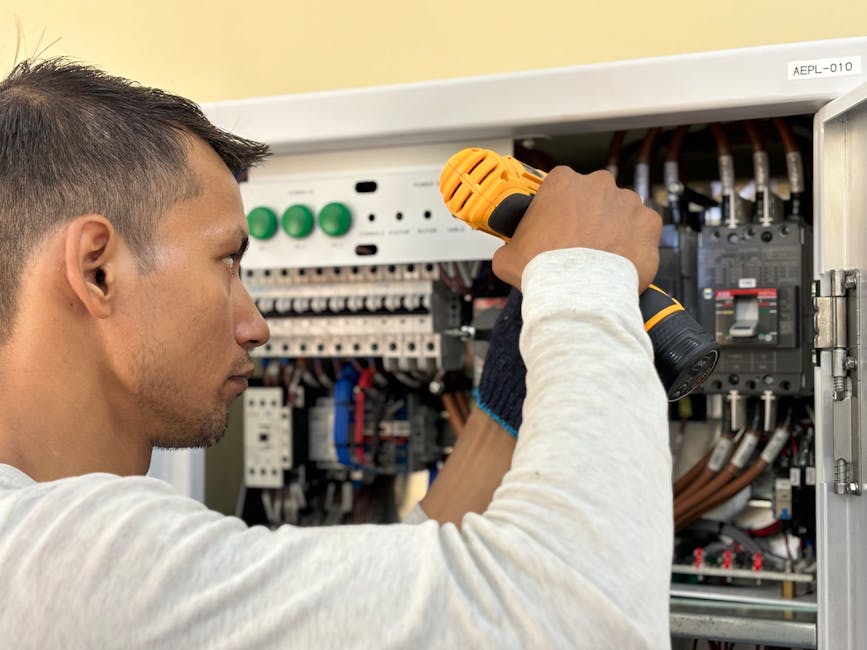


When you're looking for the best electrical in lower sackville, ns, you need contractors who understand the unique mix of older homes and new developments in this established community. From updating panels in 1970s bungalows to wiring new family homes, the right electrical partner makes all the difference.
Top Electrical Services in Lower Sackville:
Many Lower Sackville properties still operate with electrical systems designed for a different era. Modern appliances, home offices, electric vehicles, and advanced heating systems all demand more from your electrical infrastructure than ever before. Outdated wiring doesn't just struggle to keep up - it can lead to increased energy consumption, damaged electronics, and serious safety hazards.
For comprehensive electrical solutions throughout Halifax Regional Municipality, explore our electrical services in Halifax. Ready to upgrade your electrical system? Contact us for a professional assessment in Lower Sackville.
Whether you're dealing with frequent breaker trips, planning a renovation, or simply want to ensure your home's electrical system is safe and efficient, understanding your options helps you make informed decisions. Local electricians who know Sackville's building stock - from established neighborhoods around Sackville Drive to newer subdivisions - bring valuable expertise to every project.
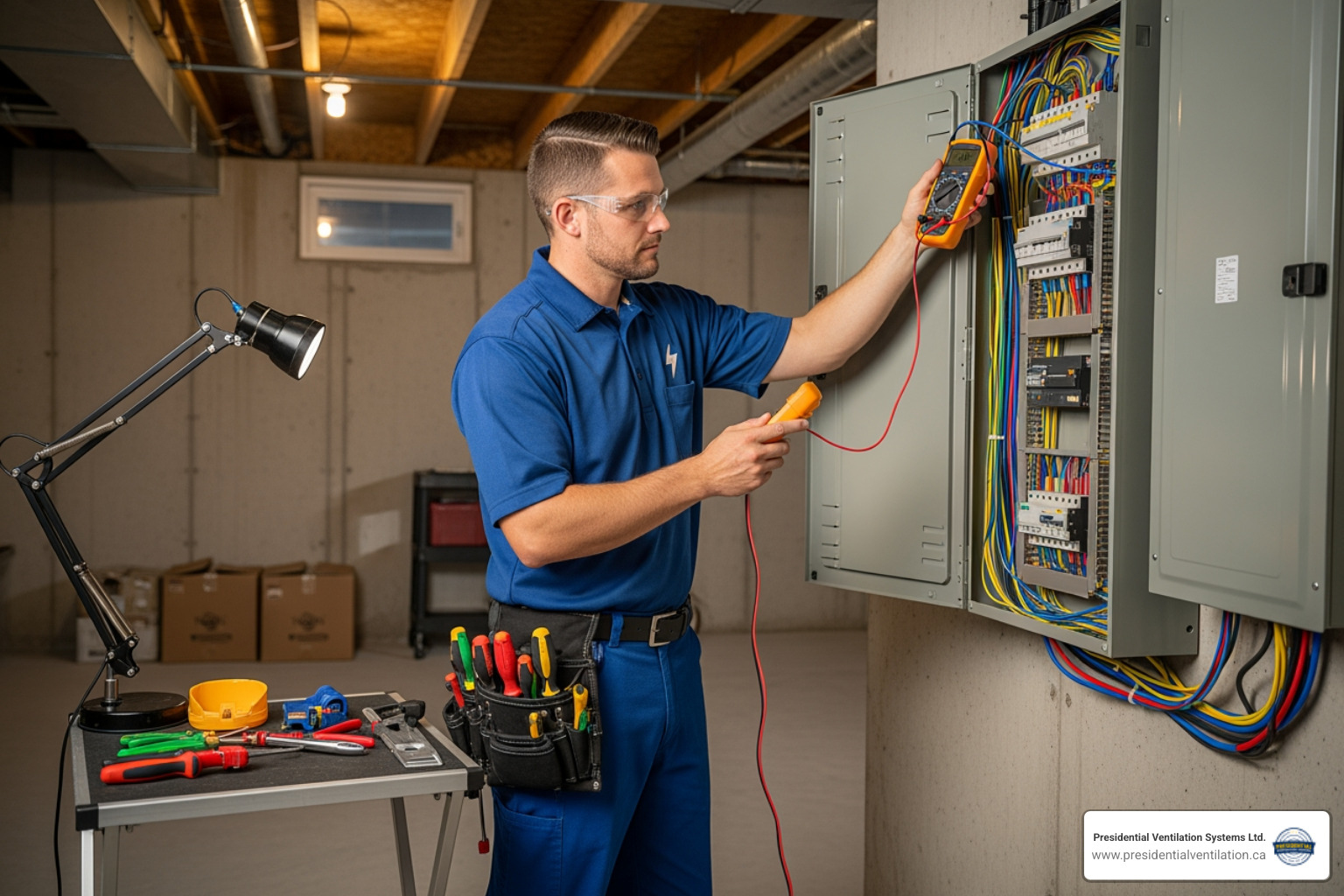
Lower Sackville, with its distinct community feel, presents a fascinating blend of residential and commercial electrical needs. From the charm of 1970s bungalows to the modern demands of newly constructed family homes and the busy local businesses, each property has its own electrical story. We recognize that understanding these specific property types in Sackville is crucial for providing the most effective and custom electrical solutions.
Many homes and businesses in Lower Sackville still operate with outdated electrical systems, which can struggle significantly to meet the power demands of contemporary living. Think about all the devices we rely on daily: high-definition televisions, powerful kitchen appliances, home office setups, and charging stations for our growing collection of gadgets. These modern conveniences put a strain on older electrical infrastructures that were never designed for such loads.
Unaddressed electrical issues stemming from these outdated systems are not just inconvenient; they can lead to a cascade of problems. You might notice increased energy consumption as your system works harder than it should, or damaged electronics due to inconsistent power. Most critically, outdated electrical systems pose serious fire hazards, putting your property and loved ones at risk. That is why ensuring your electrical system is up to code and capable of handling your current and future needs is paramount. For a deeper dive into local electrical considerations, consult our Electrical Lower Sackville NS Guide.
When residents and businesses in Lower Sackville seek the best electrical in lower sackville, ns, they often require a range of services designed to improve safety, efficiency, and comfort. From foundational system upgrades to specialized installations for modern technology, we offer comprehensive solutions. Our goal is to provide reliable power that supports every aspect of your daily life and business operations. Explore our full suite of Electrical Services Lower Sackville NS.
One of the most critical services we provide in Lower Sackville is panel upgrades and service improvements. Many older homes in the area were built with fuse boxes, a technology that was perfectly adequate for the electrical demands of their time. However, modern living has significantly increased our energy needs. Today’s homes are filled with appliances, electronics, and heating systems that require a much higher and more consistent power supply.
Panel upgrades involve removing these outdated fuse boxes and installing modern circuit breaker systems. These advanced systems are designed to support higher energy loads, offering greater safety and reliability. A common scenario we encounter is a homeowner with a 1970s bungalow looking to upgrade their electrical panel to 200 amps to meet current code and support new appliances. This not only brings the home up to modern standards but also prevents frequent breaker trips and potential overloads.
Panel replacements and most system upgrades require permits to ensure compliance with provincial codes. We carefully handle all permitting and inspection arrangements as part of our electrical services in Lower Sackville, NS, ensuring your upgrade is not only effective but also fully compliant and safe. This commitment to code compliance is a hallmark of the best electrical in lower sackville, ns. For more information on system improvements, refer to our Electrical Guide Lower Sackville NS.
Lighting plays a pivotal role in the ambiance, safety, and functionality of any home or business. In Lower Sackville, we offer a wide array of interior and exterior lighting installations designed to meet diverse needs and aesthetic preferences. Whether you're looking to brighten your kitchen with sleek under-cabinet lighting, add security with exterior floodlights, or create a cozy atmosphere with strategically placed pot lights, we have the expertise to bring your vision to life.
Beyond new installations, electrical renovations and rewiring are frequently requested, especially for older properties. Many homes in the region may still have outdated or even unsafe wiring, such as aluminum wiring, which was common in the past but can pose risks over time. We specialize in aluminum wiring upgrades, replacing it with safer copper alternatives to improve performance and meet modern electrical code standards. Full-home rewiring for a 1970s-era bungalow, for example, can dramatically improve safety and electrical capacity.
Our services extend to all aspects of electrical renovations, ensuring that any modifications to your home or business are executed with precision and adherence to the highest safety standards. From adding recessed lighting during a home renovation to upgrading commercial lighting for energy efficiency, we provide comprehensive and reliable solutions.
As technology evolves, so do our electrical needs. In Lower Sackville, we are increasingly helping residents and businesses adapt their properties to support cutting-edge technologies and conveniences. These specialized installations are key to ensuring your property remains functional, efficient, and ready for the future.
One of the most sought-after services today is the installation of Electric Vehicle (EV) chargers. As more people accept electric transportation, dedicated home charging stations are becoming a standard residential electrical need. We expertly install these units, ensuring they are safely integrated into your home's electrical system and meet all local codes.
Beyond EVs, modern comfort solutions like ductless heat pumps and electric in-floor heating are gaining popularity. Heat pumps offer efficient heating and cooling, while electric in-floor heating provides luxurious warmth, especially in bathrooms and basements. We handle all the electrical work required for these systems, from connecting new heat pump units to wiring electric in-floor heating mats. We even assist clients transitioning from oil heating to electric, which often involves service upgrades, electric water heater installations, and comprehensive wiring for heat pumps.
Smart home devices, such as programmable thermostats, automated lighting, and integrated security systems, are also changing how we interact with our homes. We provide the necessary electrical infrastructure and connections to ensure these smart devices function seamlessly.
Finally, for improved reliability and peace of mind, especially during Nova Scotia's unpredictable weather, generator panels are an excellent investment. Backup generator systems are important for maintaining power during outages, and we install the necessary transfer switches and wiring to ensure your home or business remains powered when the grid goes down. These specialized services are what truly set apart the best electrical in lower sackville, ns. For further details on modern electrical solutions, visit our Electrical Services Bedford NS page.
Investing in professional electrical upgrades for your Lower Sackville property offers far more than just convenience; it’s an investment in safety, efficiency, and future-proofing. When considering the best electrical in lower sackville, ns, understanding the profound benefits of these upgrades is essential. Our services are designed to bring long-term value to your home or business.
The primary benefit of professional electrical upgrades is significantly enhancing safety. Outdated electrical systems are a leading cause of residential fires, making the prevention of fire hazards a top priority. We identify and rectify potential risks such as frayed wiring, overloaded circuits, and faulty connections. Installing modern safety features like Ground Fault Circuit Interrupters (GFCIs) and Arc Fault Circuit Interrupters (AFCIs) in appropriate areas provides critical protection against electrical shocks and fires.
Beyond fire safety, protecting your valuable electronics is crucial. Unexpected voltage spikes, often caused by lightning or power grid fluctuations, can instantly fry sensitive appliances. Surge protection systems, particularly whole-home surge protection, safeguard all connected devices, offering peace of mind.
System efficiency is another major gain. Many homes and businesses in Lower Sackville operate with electrical systems that struggle to meet modern power demands, leading to increased energy consumption. Upgrading outdated wiring and panels ensures your system operates optimally, reducing energy waste. For commercial spaces, we offer energy-efficient improvements such as lighting retrofits and occupancy sensor installations, which can lead to a significant reduction in energy use. Regular electrical safety audits are also invaluable, especially when buying, selling, or renovating a property, as they identify potential problems before they become major repairs. Learn more about our safety and efficiency solutions on our Electrical Services Dartmouth NS page.
In today’s rapidly evolving world, future-proofing your electrical system is a smart strategic move for any Lower Sackville homeowner or business. Our electrical upgrades ensure your property can seamlessly integrate new appliances, accommodate home additions, and meet the demands of new construction electrical projects.
Modern appliances are increasingly power-hungry, and older electrical systems often lack the capacity to support them without tripping breakers or causing other issues. By upgrading your panel and wiring, you ensure your home is ready for that new induction stove, high-efficiency dryer, or advanced home entertainment system. Similarly, if you're planning home additions or extensive renovations, ensuring your electrical system can handle the increased load is critical. We provide full electrical installations for new construction projects, ensuring they are built to code specifications from the ground up.
Meeting modern electrical code standards is not just about compliance; it's about ensuring safety and functionality for decades to come. Nova Scotia electrical code standards are designed to keep properties safe and efficient, and our work prioritizes adherence to these regulations. By investing in comprehensive electrical solutions now, you avoid extensive retrofits and headaches down the road, ensuring your Lower Sackville property remains safe, functional, and valuable. For insights into preparing your property for the future, visit our Electrical Services Mount Uniacke NS page.
When searching for the best electrical in lower sackville, ns, you want to ensure you're entrusting your property to skilled, reliable, and trustworthy professionals. Choosing the right electrician is a crucial decision that impacts your safety, comfort, and the longevity of your electrical systems. We believe in empowering our clients with the knowledge to make informed choices.
Here's a list of questions to ask a potential electrician:
What truly distinguishes the best electrical in lower sackville, ns? It comes down to a combination of expertise, dedication to safety, and transparent customer service. Here are the key qualities we believe every top-tier electrical contractor should possess:
We are dedicated to powering homes and businesses with excellence, reliability, and innovation, ensuring that every project meets the highest standards. For more on what to look for in a quality electrician, visit our Electrical Services Truro NS page.
Operating an electrical system safely and legally in Lower Sackville, and indeed across Nova Scotia, hinges entirely on strict adherence to licensing and compliance requirements. This isn't just bureaucratic red tape; it's a fundamental safeguard for your property and everyone within it.
Nova Scotia electrical code standards are rigorous and constantly updated to reflect the latest in safety technology and practices. Any electrical work, from minor repairs to major installations, must meet these provincial codes. This ensures that the wiring, components, and overall system are installed correctly and safely, minimizing risks like electrical fires, shocks, and system failures.
A critical aspect of compliance is the necessity of permits for most electrical upgrades and panel replacements. For example, if you're undertaking a panel upgrade to replace an old fuse box or installing a new electrical service for an addition, a permit is required. This permit ensures that a qualified professional reviews the proposed work and that the completed installation is inspected by the appropriate authorities. We handle all permitting and inspection arrangements as part of our electrical services in Lower Sackville, NS, taking the guesswork and hassle out of the process for you.
Engaging licensed technicians is non-negotiable. Licensed electricians have undergone extensive training, passed rigorous exams, and are up-to-date with current codes and safety protocols. Their licensing also typically means they are insured, providing an additional layer of protection for you should any unforeseen issues arise. By insisting on licensed and qualified professionals, you ensure that your electrical work is not only compliant but also executed to the highest standards of safety and quality. This commitment to proper procedure is a cornerstone of the best electrical in lower sackville, ns. For further details on proper electrical practices, refer to our Electrical Services Beaver Bank NS page.
We understand that electrical systems can be complex, and you likely have questions about maintaining and upgrading your home's electrical infrastructure. Here are some of the most common questions we receive from residents in Lower Sackville.
For optimal safety and performance, we recommend a professional electrical inspection every 3–5 years, especially if you live in an older home in Lower Sackville. Older homes often have wiring and panels that may not be up to current code or sufficient for modern electrical demands.
However, if you notice any warning signs, don't wait for your scheduled inspection. Flickering lights, frequent breaker trips, buzzing outlets, or the smell of burning plastic are all indicators of potential electrical problems that require immediate attention. In such cases, we advise scheduling an evaluation right away to ensure the safety of your home and family. Proactive inspections can identify minor issues before they become major repairs or safety hazards.
Yes, generally, permits are necessary for most significant electrical upgrades and panel replacements in Lower Sackville and across Nova Scotia. This requirement is in place to ensure that all electrical work adheres to provincial codes and safety standards.
For instance, if you're upgrading your electrical panel, adding a new circuit, or undertaking extensive rewiring, you will need a permit. The permit process ensures that the work is planned correctly and inspected upon completion by a qualified authority. As part of our comprehensive electrical services in Lower Sackville, NS, we handle all permitting and inspection arrangements. This means you don't have to steer the bureaucracy; we ensure your project is fully compliant from start to finish, giving you peace of mind that the work is done correctly and safely.
A circuit breaker that frequently trips is your electrical system's way of telling you there's a problem, and it should be addressed promptly.
First, try resetting the affected breaker. Often, a single trip can be due to a temporary overload from too many devices plugged into one circuit. If the breaker resets and holds, you might just need to redistribute your electrical load.
However, if the breaker continues to trip repeatedly, it indicates a more serious underlying issue. This could be due to a persistent overload (meaning the circuit isn't designed to handle the power demand you're placing on it), a wiring fault (such as a short circuit or ground fault), or a faulty breaker itself. Continuing to reset a tripping breaker without addressing the root cause can be dangerous. In such situations, we strongly advise contacting our licensed electricians for a safe diagnosis. We can accurately identify the problem and provide the appropriate solution, ensuring the safety and reliability of your electrical system.
When it comes to your home or business, choosing the best electrical in lower sackville, ns is more than just finding someone to fix a wire; it's about partnering with a company that prioritizes your safety, comfort, and long-term satisfaction. We pride ourselves on offering comprehensive, customer-focused electrical services that go beyond quick fixes. Our commitment is to provide long-term electrical solutions, ensuring your system is reliable, efficient, and up-to-date.
We emphasize quality, consistency, and transparent communication in every project we undertake. Our team of experienced professionals understands the unique electrical needs of Lower Sackville properties, from older homes requiring careful upgrades to new constructions needing robust, future-ready systems. We handle all aspects, from detailed electrical system assessments and safety audits to ensuring all work is code-compliant and properly permitted.
For added peace of mind and long-term value, consider our maintenance plans, which include scheduled system checks and early fault detection. These plans help you stay ahead of system wear and potential breakdowns, ensuring your electrical infrastructure remains in top condition.
As Presidential Ventilation Systems Ltd., we are dedicated to being your trusted partner for all your electrical needs. We invite you to experience the difference that professionalism, expertise, and a genuine commitment to customer satisfaction can make.
Ready to improve the safety, efficiency, and comfort of your Lower Sackville property? Contact us for your electrical needs in Lower Sackville, NS today.